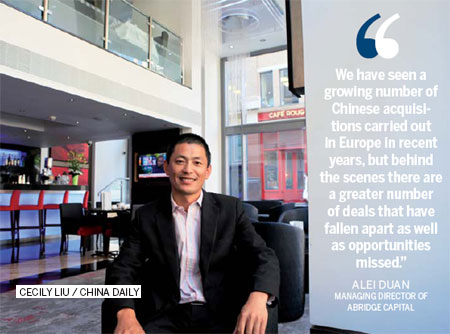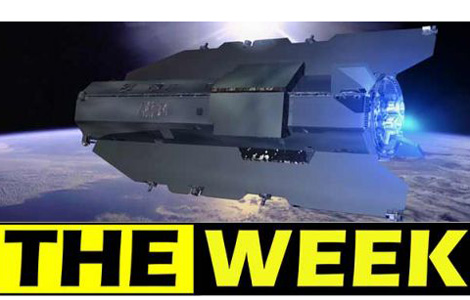Chinese firms 'slow to deal'
Updated: 2013-10-11 09:53
By Cecily Liu and Zhang Chunyan (China Daily)
|
|||||||||||
Companies may be missing out on some of the best acquisitions in Europe, expert says
Chinese companies are still struggling to make the best of acquisition deals in Europe compared with their Western counterparts, says Alei Duan, managing director of financial advisory firm Abridge Capital.
Duan says this is partly due to their distance from the market and unfamiliarity with it, which often means spending a long time on research and making decisions.
"We have seen a growing number of Chinese acquisitions carried out in Europe in recent years, but behind the scenes there are a greater number of deals that have fallen apart as well as opportunities missed."
Duan says Chinese acquisitions in Europe grew significantly after many European companies fell into financial difficulties due to the eurozone crisis, but major competitors for these assets are US companies. As Chinese companies are less experienced at making acquisitions in Europe, they are often not very decisive about whether to offer a deal, or at what price point to offer, he says.
"There have been some cases my team worked on, where Chinese buyers couldn't fit in with the speed of deals required by the market, which means the assets were sold to US buyers or other buyers who could act quickly," he says.
Duan says US competitors are more culturally similar to UK companies, which can put Chinese buyers at a disadvantage.
Another worry about Chinese buyers is intellectual property protection, he says, adding that he once worked on a deal that failed because the UK seller feared its technology might be copied in China.
This is often the case with companies that are selling only their Chinese or Asian operations, he says.
Challenges aside, Duan says Chinese companies can derive considerable benefits from acquisitions in Europe provided their approach is appropriate during the post-acquisition integration stage.
"I think this is the hardest part, because the value of the business you buy lies in the people that work there, and inappropriate management would make them leave and destroy the value of what you have bought," Duan says.
An example of what should be avoided comes from Japanese acquisitions in the UK in the 1980s, which were common at that time. Japanese owners made employees do group morning exercises, the norm in Japan, but beyond comprehension for UK employees.
Chinese buyers have had more time than their Japanese counterparts to learn the importance of localization, but a common mistake they make is exerting too much control from head office, Duan warns.
"Some Chinese owners think they need to influence the business, so they dictate things to be done in a certain way. But sometimes it is best to leave detailed decisions to local managers who are familiar with the European market.
"The more successful Chinese acquisitions tend to be those that leave the previous management team of the acquired companies in control of the European market."
Duan says the type of optimal business culture after acquisition would depend on the original purpose of the acquisition.
"For example, if the purpose of the acquisition is to establish R&D in Europe, then it is perfectly fine to keep the previous Western corporate culture of the business.
"But if the acquisition is done to sell Chinese goods in Europe, then perhaps there should be a rebranding of the target company's business culture to suit the sales strategy."
Duan says there are many good opportunities for Chinese acquisitions in sectors such as manufacturing, automotive and healthcare industries.
Because manufacturing in some European countries is declining, he says, Chinese companies can sometimes acquire good technology at competitive prices to benefit production in China.
As China's automotive and healthcare industries grow rapidly, it would also make sense for Chinese companies to make acquisitions in these sectors, so they can enjoy top quality European technology and R&D expertise.
"Technology and R&D teams take a very long time to build," Duan says. "As European companies already have invested decades to build them, they become very valuable to Chinese buyers."

( China Daily European Weekly 10/11/2013 page7)
Today's Top News
Boeing airliner crashes in Russia, 50 killed
Lanzhou takes lead to curb car use
EU, China in right direction
Bringing China's best minds home
Abe busy in ASEAN at Beijing
China police nab 4 drug suspects
President Xi meets Dutch PM
Decisive market tackles overcapacity
Hot Topics
Lunar probe , China growth forecasts, Emission rules get tougher, China seen through 'colored lens', International board,
Editor's Picks

|

|

|

|

|

|





